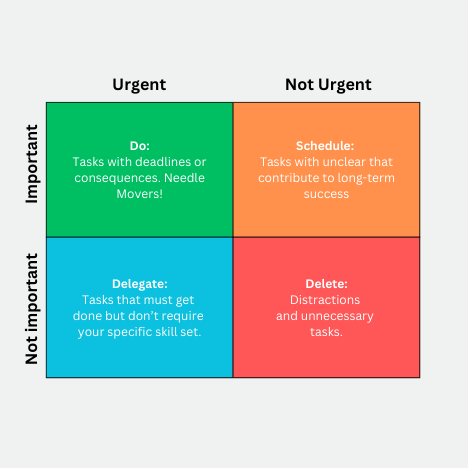When it rains, it pours. That’s life. Between managing work, personal commitments, and the curveballs life throws your way, feeling overwhelmed can be normal to feel sometimes. This state of overwhelm isn’t just about having too much on your plate—it’s about the emotional weight that comes with it, making even simple tasks feel monumental. If this sounds familiar, don’t worry. You’re not alone, and better yet, there’s a way out. Here’s a practical one-week plan to help you regain control and peace of mind. This is stretched into a day-to-day execution to not add more to your already busy life. However, if you can do more go for it!
But First: Understanding Overwhelm
What Does It Mean to Feel Overwhelmed?
Feeling overwhelmed is like trying to juggle too many balls in the air while worrying one will drop. It’s an emotional state where the demands on you exceed your perceived ability to manage them. This can result in stress, anxiety, and even physical exhaustion. If you are a high achiever or a perfectionist this feeling is so common. Why? Because we feel that we can do it all and that we are more than capable! This can lead to burnout which is very similar to feeling overwhelmed.
Why Does Overwhelm Happen?
Common causes include:
- Unrealistic expectations: Trying to be perfect or do everything at once. (Sound familiar?)
- Poor time management: Feeling scattered and unsure of where to start. (Analysis paralysis)
- Life transitions: New job, moving to a new city, or starting college.
Life can feel overwhelming when we are trying to strive for greater things. If one thing is certain in life is that problems will come. In what magnitude and quantity? No one knows! That’s what makes life, life. The first step is to understand the feeling and what is actually causing it. If it is unrealistic expectations it is important to realign those expectations.
One example would be when I was managing a restaurant and I would hire new people and I would get frustrated and overwhelmed when I would have to repeat myself and they would make mistakes. The problem isn’t that they weren’t smart or I hired the wrong people. The issue was my expectations of how quickly I expected them to get a handle on the position so I wouldn’t need to be as involved. The best practice was to first align my mental expectation. Then I would align my expectations with them so that way if they weren’t getting it by the expected time frame it was not a surprise if this role wasn’t suited for them.
The One-Week Plan to Regain Control
Day 1: Acknowledge and Assess
Let’s break down the overwhelm. Start by acknowledging your feelings. Write down everything weighing on your mind. This step creates clarity and reduces mental clutter.
Example Exercise:
- Write a list of all your stressors.
- Group them into “controllable” and “uncontrollable” categories.
When I did this exercise, I realized I was stressing over things outside my control, like other people’s opinions. This simple realization lifted a huge mental weight. The majority of the things we stress about are things that are out of our control! Of course, we are going to stress, why? As humans, we need the feeling of certainty and control. When it is out of our hands and control, we stress.
Best practice: Decide how you are going to respond and feel when something is out of your control. Responding is playing offense versus reacting which is playing defense.
Day 2: Declutter Your Mind
Now that you’ve assessed, it’s time to offload. Practice a brain dump: write down every task and worry without judgment. Remember this is for you no one else. When we write it down and see it, we can actually begin to process the things that are causing the overwhelm. You may be surprised that it may not be as much as you think.
Tips:
- Prioritize tasks using the Eisenhower Matrix (urgent vs. important).
- Practice mindfulness with deep breathing or meditation.
Mindfulness became a game-changer for me. Spending even five minutes focused on breathing gave me the clarity to tackle my day more effectively. Understanding this matrix is the game changer!

Quadrant 1: Do
These are urgent and important. Things that cannot wait and will have immediate consequences. This can be anything with a pressing deadline and requires your skills and attention. The key is needle movers like bringing in sales or getting assignments in.
Quadrant 2: Schedule
These are important but not urgent. These move the needle over time. An example would be working out or getting maintenance done on your car now that the light has come on. These seem urgent but in reality, can be scheduled. Once they are on the calendar they are out of mind and getting done.
Quadrant 3: Delegate
It’s not important but urgent. This is an easy quadrant to confuse with quadrant 1 and this is why we get so stressed out and don’t ask for help. Examples are responding to emails, counting inventory, placing purchase orders, or even cleaning the house. The key is understanding that these are urgent and are part of daily operations but at the same time you are not the only one that knows how to do them. Learn what can be delegated or handled by someone else.
Quadrant 4: Delete
Not important and not urgent. Delete them. Examples are watching TV, scrolling social, calling friends to just to pass the time, etc. The key word is distraction. One thing is processing with a friend who can actually help you solve a problem and another thing is gossiping and talking about things that don’t matter. If it is robbing your time and not adding value to your life, delete it.
Day 3: Create a Realistic Plan
Use your insights from Day 2 to craft a manageable schedule. Break tasks into smaller, actionable steps.
Action Steps:
- Use tools like Google Calendar or a planner to structure your day.
- Allocate time for breaks to avoid burnout.
When I began time-blocking my calendar, I realized how much time I wasted on distractions. Planning allowed me to reclaim hours I thought were lost. Remember that time is a commodity we spend without ever knowing the balance! Don’t waste it winging it!
Day 4: Set Boundaries
Learning to say “no” is essential to prevent further overwhelm. Set boundaries around your time and energy.
Practical Tips:
- Politely decline tasks that don’t align with your priorities.
- Set limits on how long you’ll spend on emails or social media.
During the time of feeling overwhelmed saying, “no” will need to be normal. The people who support you will understand the others who don’t, may be time to analyze our inner circle and who you will spend our time with.
Day 5: Prioritize Self-Care
Overwhelm thrives when self-care is neglected. Your physical and mental health are the foundation of productivity. Focus these in quadrant two and schedule them accordingly.
Ideas for Self-Care:
- Sleep: Aim for 7–8 hours a night.
- Nutrition: Fuel your body with healthy, energizing foods.
- Movement: A quick walk or yoga session can do wonders.
Day 6: Seek Support
Talk to someone you trust, whether it’s a mentor, friend, or coach. Sharing your struggles can provide new perspectives and emotional relief.
Ways to Seek Support:
- Join a community group or online forum.
- Schedule a coffee chat with a friend who understands your situation.
During one particularly stressful time, I reached out to a mentor who helped me reevaluate my priorities. Sometimes, just having someone listen can lighten the load.
Day 7: Reflect and Reassess
Take stock of your progress and celebrate the small wins. Reflecting on what worked and what didn’t sets you up for future success. Also, give yourself some credit. The fact that you are here reading this means that you want more for your future and that itself is a win.
The most important out of all exercises is to practice gratitude. The fact that you are feeling overwhelmed means you have been blessed with more and are being called higher. It is easy to forget that where we are now was once a dream when we were younger. My favorite saying is, “It’s hard to complain about having too much on my plate when the original goal was to eat.”
Reflection Prompts:
- What task was the most satisfying to complete?
- Which strategies helped you feel the most in control?
- What will you do differently next time?
- How can gratitude be incorporated daily?
Tips for Staying in Control Moving Forward
- Embrace Imperfection: You don’t have to get everything right. Progress matters more than perfection.
- Schedule Weekly Check-Ins: Reflect on your week and adjust plans as needed.
- Build a Long-Term Routine: Incorporate habits like journaling, mindfulness, or regular exercise to keep overwhelm at bay.
Conclusion
Feeling overwhelmed is natural, especially when you’re navigating life’s complexities. The key is not to let it paralyze you. By following this one-week plan, you can regain control, clarity, and confidence. Small, consistent steps lead to big changes over time. However, this is just a tool and a guide! Find what works for you and share with others if it adds value!
So, take a deep breath and start today. You’ve got this!
References
- Mind Tools Editorial Team. “The Eisenhower Matrix: Making Urgent vs. Important Decisions.” Mind Tools. Mind Tools Content Team, available at https://www.mindtools.com/a2jzyxj/the-eisenhower-matrix (accessed December 3, 2024).
- Headspace Inc. “Headspace: The Mindfulness App.” Headspace, available at https://www.headspace.com/ (accessed December 3, 2024).
- Psychology Today. “How to Stop Feeling Overwhelmed.” Psychology Today, available at https://www.psychologytoday.com/us/blog/urban-survival/201810/how-to-stop-feeling-overwhelmed (accessed December 3, 2024).





